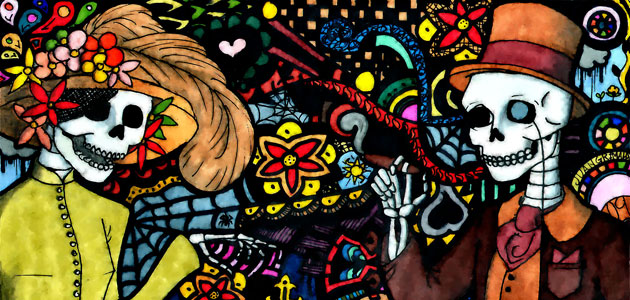Hello everyone! I would like to share a bit of this great Mexican holiday called Day of the Dead (Spanish: Día de los muertos)!
I hope you will enjoy this as us in Mexico.


To start, there I will describe what
Day of the Dead means:
From wikipedia:
"Day of the Dead (Spanish: Día de Muertos) is a Mexican holiday celebrated throughout Mexico, in particular the Central and South regions, and by people of Mexican ancestry living in other places, especially the United States. It is acknowledged internationally in many other cultures. The multi-day holiday focuses on gatherings of family and friends to pray for and remember friends and family members who have died."
The holiday is sometimes called
Día de los Muertos in Anglophone countries, a back-translation of its original name,
Día de Muertos. It is particularly celebrated in Mexico where the day is a public holiday. Prior to Spanish colonization in the 16th century, the celebration took place at the beginning of summer. Gradually, it was associated with October 31, November 1, and November 2 to coincide with the Western Christianity triduum of Allhallowtide: All Saints' Eve, All Saints' Day, and All Souls' Day.
Traditions connected with the holiday include building private altars called ofrendas, honoring the deceased using calaveras, aztec marigolds, and the favorite foods and beverages of the departed, and visiting graves with these as gifts. Visitors also leave possessions of the deceased at the graves.
This is an example of a private altar:
 Also there are 3 types of altars from 2, 3 and 7 stages, If you want more info ask me for sure I will try to explain you!!There are more example if you want to search
Also there are 3 types of altars from 2, 3 and 7 stages, If you want more info ask me for sure I will try to explain you!!There are more example if you want to search
The Mexican Day of the Dead celebration is similar to other societies' observances of a time to honor the dead. The Spanish tradition, for instance, includes festivals and parades, as well as gatherings of families at cemeteries to pray for their deceased loved ones at the end of the day.
On October 31, All Hallows Eve, the children make a children's altar to invite the angelitos (spirits of dead children) to come back for a visit. November 1 is All Saints Day, and the adult spirits will come to visit. November 2 is All Souls Day, when families go to the cemetery to decorate the graves and tombs of their relatives. The three-day fiesta is filled with marigolds, the flowers of the dead; muertos (the bread of the dead); sugar skulls; cardboard skeletons; tissue paper decorations; fruit and nuts; incense, and other traditional foods and decorations.
FoodDuring Day of the Dead festivities, food is both eaten by living people and given to the spirits of their departed ancestors as ofrendas ("offerings").
Tamales are one of the most common dishes prepared for this day for both purposes.
Pan de muerto and
calaveras are associated specifically with Day of the Dead. Pan de muerto is a type of sweet roll shaped like a bun, topped with sugar, and often decorated with bone-shaped phalanges pieces.. Calaveras, or sugar skulls, display colorful designs to represent the vitality and individual personality of the departed.
In addition to food, drink is also important to the tradition of Day of the Dead. Historically, the main alcoholic drink was
pulque while today families will commonly drink the favorite beverage of their deceased ancestors. Other drinks associated with the holiday are atole and champurrado, warm, thick, non-alcoholic masa drinks.
Jamaica iced tea is a popular herbal tea made of the flowers and leaves of the Jamaican hibiscus plant (Hibiscus sabdariffa), known as flor de Jamaica in Mexico. It is served cold and quite sweet with a lot of ice. The ruby-red beverage is called hibiscus tea in English-speaking countries and called agua de Jamaica (water of Jamaica) in Spanish.
Thanks for reading!
Feliz día de muertos!!